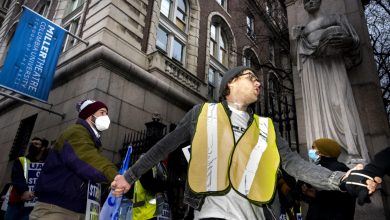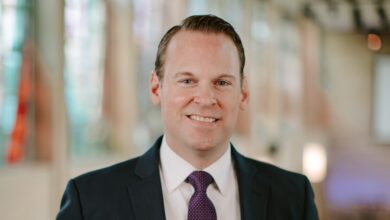What Counts as Discrimination on a College Campus?

The office investigated and concluded that, while Minnesota maintained that the program was open to males, its marketing materials suggested otherwise. In a signed resolution agreement, the college committed to updating its application and promotional materials, as well as its website.
The camp’s website now includes a disclaimer stating that it is “open to all students regardless of sex.” But the name of the camp hasn’t changed, the photo still shows only girls, and a question at the top of the page asks “Why an All Girls* Camp?”
Perry, who earned his business degree at the university, says more changes are needed, and has asked OCR to investigate further.
Perry’s alma mater is not the only institution in his sights. Over the past seven years, he has filed close to 850 complaints with OCR, alleging more than 2,000 violations of federal antidiscrimination law by more than 750 colleges. The office has opened more than 375 investigations into those complaints and resolved 345 of them, mostly to his satisfaction, he says.
His campaign to end sex- and race-restricted policies, programming, and scholarships has inspired others to file hundreds of complaints of their own. And it has prompted the Office for Civil Rights to add two new categories to its list of databases tracking open and recently resolved complaints: “single-sex scholarships” and “single-sex campus programs.”
To Perry and the other complainants, the law couldn’t be clearer. Title VI of the Civil Rights Act and Title IX of the Education Amendments of 1972 state that, in any program or activity that receives federal funds, “No person in the United States shall … be excluded from participation in, be denied the benefits of, or be subjected to discrimination” on the basis of race, color, and national origin (Title VI) or sex (Title IX).
“Discrimination on the basis of sex or race is unlawful even if the discrimination advantages the ‘right’ groups for the ‘right’ reasons,” Perry said. “It’s a simple matter of the law.”
That view was upheld, in a different context, by the U.S. Supreme Court’s ruling last month that colleges may not consider race when making admissions decisions. Though that decision didn’t touch on race-conscious scholarships and programs, some legal scholars, politicians, and university leaders argue that it applies to those, too. Already, several colleges have said they’ll stop considering race in awarding scholarships; many more are applying fresh scrutiny to long-established awards and programs.
While the full consequences of the court’s ruling will be hashed out in lawsuits for years to come, the decision has cast into sharp relief a fundamental, and increasingly urgent, question: What constitutes discriminatory behavior on the part of colleges?
The answer, according to some legal scholars, is not as clear-cut as Perry’s crusade makes it out to be. They argue that courts have long tolerated some forms of “positive discrimination,” especially when it compensates for past exclusion.
“Many courts have held that it’s OK to have a thumb on the scale for some period of time for people who have been disadvantaged in the past,” said Wendy J. Murphy, an adjunct professor of law at New England Law, in Boston, who has written widely about Title IX. Though she, for one, believes the Supreme Court’s ruling means that thumb may no longer be applied on behalf of students of color, she argues that gender-based preferences are still permitted — for now. She thinks future courts and the Education Department will eventually move to outlaw those as well.
Murphy and other critics also say the complaints misinterpret the intent of Title VI and Title IX, ignoring the context in which they were passed more than 50 years ago: as a corrective measure to a history of harm. The debate comes down to this: Does the letter of the law differ from its spirit? If so, which should the federal government enforce?
The Office for Civil Rights is likely to be where much of the impact of the Supreme Court’s ban on race-conscious admissions gets hammered out. This month, for instance, three legal-advocacy groups filed a complaint with the OCR alleging that admissions preferences for the children of alumni and donors discriminate against minority applicants.
But looking at how colleges have carried out agreements reached with the office in response to Perry’s complaints does not settle the question of what counts as discrimination. While some colleges, like the University of Minnesota, have simply added disclaimers to their websites, several have done more to open programs to all races and genders, and others have scrapped their programs altogether.
The majority of agreements are not made public, and the Office for Civil Rights declined to answer questions about its handling of the complaints, or the adequacy of institutions’ responses. This spring, The Chronicle contacted the 20 colleges known to have reached formal resolutions with OCR since 2020 to ask how those changes are affecting who participates in programs and receives scholarships. Among the 13 that responded and agreed to comment were colleges that said they had admitted applicants who in the past would have been excluded, and colleges that said they still hadn’t had any such applicants.
One thing is clear: The office tends to give colleges options that they can interpret in either substantive or superficial ways.
Perry, then a finance professor at the University of Michigan at Flint, had heard that Michigan State University, 50 miles west, still had a space set aside for women in its student union, decades after the demise of its men’s lounge. It sounded to him like a glaring example of gender apartheid. So he decided to investigate.
On a visit to East Lansing in the summer of 2016, Perry discovered that the lounge occupied an “entire wing of the first floor” of the union — prime real estate reserved for the use of a single sex. Since women had outnumbered men in higher education for years, the lounge struck him as both morally wrong and unnecessary. And he was certain it was illegal.
Back in Flint, Perry filed a complaint with the Michigan Department of Civil Rights, sharing it with a contact at The Daily Caller, a conservative publication. The story was picked up by The Washington Post, and the lounge, by then under renovation, reopened as a co-ed study area the following fall.
A spokesman for Michigan State said that, when Perry filed his complaint in July 2016, administrators had already decided to convert the lounge “to ensure access for all students,” and “not as the result of any one individual’s complaint.” But Perry, who had raised his concerns with the college’s Title IX coordinator back in April, before that decision was made, was certain it was his attention that motivated the university — and the perceived success motivated him, in turn. After successfully challenging a handful of faculty awards and a girls-only engineering camp on his own campus, using state and internal processes, he filed his first federal complaint — against the University of Michigan and its alumnae council — in 2018.
When OCR receives a complaint, its lawyers and investigators evaluate it to determine whether the agency has jurisdiction over the subject matter and accused entity; whether the complaint is timely (filed within 180 days of the alleged discrimination); and whether the complaint contains enough detail to investigate. If it meets those criteria, the agency will open an investigation. The amount of time this process takes — and the time it takes to complete an investigation — varies widely, from a few months, to years. (Perry says he is still waiting for a response to his first federal complaint, more than four years later).
Perry casts himself as a civil-rights advocate for male white and Asian students, faculty, and staff who are too scared to challenge their colleges themselves.
There are no rules governing how the 12 regional offices of the Office for Civil Rights handle complaints involving single-sex and race-restricted scholarships and programs, and every resolution letter includes a clause that it “is not a formal statement of OCR policy and should not be relied upon, cited, or construed as such.” Yet despite the discretion given to the regional offices, their response to the cascade of complaints has been fairly consistent. When an office determines that a program is discriminatory, it gives colleges a choice: Close the program, or open it up to everyone. Colleges that choose the latter are typically given the option of either changing the name or keeping it, but they must make clear that the program is open to everyone. How clear that is depends on whom you ask.
In the case of scholarships, colleges have been given still more leeway. Though they’re generally prohibited from awarding race- and sex-restricted scholarships, OCR has said they may do so if they can show that an award is necessary to remedy past discrimination in the program or activity to which it applies. (National-level statistics about discrimination don’t count.) Colleges have also been allowed to award some donor-funded scholarships to targeted groups, provided that “the overall effect of the award … does not discriminate on the basis of sex,” as a Q&A issued in January 2021 states. (The office has no such guidance on race.)
In practice, that has typically meant adopting a “pool and match” approach — putting donor funds into one pot; choosing award recipients using neutral criteria, such as major or GPA; and then matching those recipients to specific scholarships, based on donor intent. That strategy could become increasingly common as colleges wrestle with the fallout from the Supreme Court’s decision.
Advocates for women and minority groups say the changes being forced by Perry and others threaten longstanding efforts to improve graduation rates for students of color and to increase the number of women in STEM careers. They view the complaints as part of a broader campaign to erase all evidence of discrimination, past and present, a campaign they say includes attacks on race-conscious admissions and bans on diversity, equity and inclusion offices, programs, and trainings.
“It’s as if they’re saying, ‘Let’s pretend discrimination never happened,” said Paulette Granberry Russell, president of the National Association of Diversity Officers in Higher Education. “That’s the most destructive aspect of what’s going on.”
And they say it subverts congressional intent, too. “Title VI was meant to elevate opportunity for people of color,” Murphy said. Lawmakers were less concerned about treating everyone the same than about “making up for past problems.” Likewise, Title IX was passed to lift up women, specifically.
But Perry said he’s simply trying to end the “selective enforcement” of federal civil-rights laws, in which the rights of favored groups are vigorously protected, while the rights of other groups are routinely violated. He casts himself as a civil-rights advocate, standing up for those male white and Asian students, faculty, and staff who are being excluded from programs and awards and are too scared to challenge their colleges themselves.
“I’m trying to pursue justice for everybody and hold universities accountable to their legal obligations, and their mission of true diversity, equity and inclusion,” Perry said. “I think it’s important to stand up for what’s right.”
Women are losing some of the very paltry remedies that exist for addressing gender inequality on campus.
Perry said he identifies potential violations through searches of college websites and Google alerts that he has set up for terms like “Bipoc” and “Girls in STEM.” Like-minded faculty, staff, students, and alumni alert him to others. He estimated that he spends at least 40 hours a week filing and tracking his complaints and answering questions from the Office for Civil Rights.
Though he operates independently, Perry is part of a loose network of collaborators that includes Adam Kissel, a visiting fellow for higher-education reform at the Heritage Foundation who previously worked for the Foundation for Individual Rights in Education (now the Foundation for Individual Rights and Expression), and Edward E. Bartlett, the founder of SAVE, an organization that has focused on the rights of the accused in sexual-assault hearings. Kissel estimated he’s filed 150 complaints; Bartlett, several hundred. The three share the results of their complaints with one another, and sometimes swap tips, but don’t coordinate their efforts, they all said.
The trio, along with Adam Ellwanger, a professor of English at the University of Houston-Downtown, has called on students and faculty members to file complaints of their own, saying men — and white, heterosexual, Judeo-Christian men in particular — are the ones now facing discrimination on many campuses.
“You don’t have to spend too much time at a university to hear someone speaking about the toxicity of masculinity, the backwardness of Christianity or Judaism, or the racism of ‘white people,’” Ellwanger wrote in a recent “call to action for conservative students and faculty.” “These hateful statements have become so routine (especially in humanities departments) that it never occurs to students that such talk could easily serve as the basis of a DEI or Title IX complaint.”
In the blog post, Ellwanger noted that “while it is unlikely that a DEI office will find in your favor,” the resulting investigation “could drag on for months” and “surely encourage even the wokest professor to think twice before he lectures again on the evils of whiteness.”
“And at the very least, newly filed complaints gum up the works at the DEI office, demanding time and resources that are already in short supply,” he concluded.
Ellwanger declined to say how much success he’s had, writing in an email that “given the left-wing slant of The Chronicle, I don’t really trust that my comments on this matter would be faithfully or positively represented.”
But Perry said he hasn’t had much luck persuading students, faculty, or staff to file complaints, even when he reminds them that it’s illegal for colleges to retaliate against individuals who do so.
“It seems college professors are the most cowardly group in society,” he said. “They have the protection of tenure, and they’re still fearful of filing a complaint with their Title IX office.”
One exception is Dorian Abbot, an associate professor at the University of Chicago who has filed complaints against 11 single-sex and race-restricted programs, with Perry’s help. Abbot, who gained national attention in 2021 when he was disinvited from delivering a geophysics lecture at the Massachusetts Institute of Technology, allegedly because of his views on affirmative action, said he was notified that several of the programs have been updated to comply with the law.
In an email, Abbot wrote that he was proud of this work, which he views as “a critical civil-rights effort.”
Perry has also found an ally in Peter Kirsanow, a Black, Republican member of the United States Commission on Civil Rights who has written to several college presidents in recent years warning that their separate programs and graduation ceremonies for people of color violate Title VI. One such letter, sent to California Polytechnic State University at San Luis Obispo last spring, asked President Jeffrey D. Armstrong to consider what might be the response if the university “held a ‘European American Commencement’ to ‘Celebrate the culture and accomplishments of European American students,’ but no comparable ceremony for African American students.””
“The effect of these separate commencement ceremonies is to segregate students based on race,” Kirsanow wrote. A spokesperson for Cal Poly said that the university continues to offer several “cultural commencement ceremonies” that all are invited to attend.
In an interview, Kirsanow said he knows colleges aren’t acting out of “racial animus” — some don’t realize they’re breaking the law, and others “believe they’re on the side of the angels when they discriminate in favor of minority groups.”
But, as he is fond of saying, federal law doesn’t have a “good intentions” exception.
“It’s a slippery slope,” he said. “Once we become comfortable with so-called ‘benign discrimination,’ who knows where it leads?”
and fellow at the Institute for Research on Male Supremacism, said she’s “disheartened and frustrated to see the Office for Civil Rights take these concerns as legitimate,” especially when the filers haven’t presented any evidence that anyone has been harmed by their exclusion from the programs and scholarships. “The harm they’re saying these scholarships present for men is just not real,” she said.
And yet, for the women who have benefited from them, their loss or dilution carries real consequences, Bedera said. “Women are losing some of the very paltry remedies that exist for addressing gender inequality on campus.”
Perry and his allies argue that women don’t need to be given any advantages in academe. They point to data that show that women have long been the majority in higher education, accounting for 58 percent of the enrollment and bachelor’s degrees in the 2021-22 academic year. These days, women dominate not only in traditionally “female” fields like education, communications, and social services, but in some science-focused fields, like biology.
“Women don’t need this special accommodation or favoritism anymore,” Perry said. “It’s men who have become an underrepresented minority.”
Gloria L. Blackwell, chief executive of the American Association of University Women, acknowledges that women now outnumber men at all degree levels but argues that “systemic inequities very much still exist.” In math-intensive fields, like engineering and computer science, for example, women earn between a quarter and a third the number of degrees as men, the data show.
“If anyone has been discriminated against when it comes to the access to opportunities and leadership in academia, it is women — and Black and Brown women even more so,” Blackwell says.
As an “equal-opportunity complainant,” as he puts it, Perry has occasionally gone after programs for men. To date, he’s filed 16 complaints against male-only programs, most of them supporting Black or other men of color. He admits to having “mixed feelings,” about such complaints, saying he sympathizes with the struggles men face in higher education, especially Black, Hispanic, and Indigenous men, who trail both white and Asian men and women of color in college enrollment and completion.

Joe Ahlquist for The Chronicle
Perry hasn’t filed any complaints against programs that focus on recruiting men of color, like the University of California at Los Angeles’s Black Male Institute, created after California outlawed affirmative action more than 20 years ago. The program, which helps prepare young men of color for college, could become a model for other states, and for colleges seeking ways to build diverse classes in the wake of the Supreme Court ruling. But Perry says he’ll be monitoring such efforts, and advises colleges to design the programs carefully.
“They could target minority populations but would run afoul of Title VI if they offer any of those programs exclusively for certain groups,” he said.
Blackwell says forcing programs aimed at closing racial and gender gaps to open to everyone — including groups that have been historically advantaged — “appears to be a misguided interpretation of Title IX and a solution to a problem that doesn’t exist.”
The complainants, meanwhile, say the same about the programs and scholarships they are targeting: that they’re a solution to a problem that doesn’t exist. They maintain that the gender imbalances in STEM fields are a result of women choosing careers that better suit their interests and abilities, and that efforts to persuade or even “coerce” them to choose otherwise aren’t working.
“The science shows girls and boys are different, and prefer different things,” said the Heritage Foundation’s Kissel. “We spend a huge amount of money trying to change the numbers, and a lot of that money is wasted.”
Bartlett, of SAVE, said that if colleges are going to invest in increasing the number of women in STEM fields, they should also invest in getting more men into nursing, teaching, and social work, fields where they are underrepresented relative to women.
“If we want to make that argument, we have to do it in an evenhanded way,” Bartlett said.
As for the racial gaps in college-graduation rates, that’s K-12’s problem to solve, the complainants argue. Achievement gaps open up long before college, and remedial steps like programs or scholarships won’t undo the damage, Kirsanow said.
But Granberry Russell and other advocates for women and students of color point out that the complainants aren’t offering any clear alternatives to the programs and scholarships they attack.
“There’s nothing they advocate for” that would otherwise address “breadth and depth of the disadvantages and lack of opportunities that arose in response to past discrimination,” she said.
Perry and the other complainants believe many faculty members, staff, and administrators are either unaware or unconcerned that single-sex and race-restricted programs and awards violate federal civil-rights laws, and don’t bother to get legal clearance before introducing them. But once the lawyers get involved, “things can change quickly,” Perry said.
In some cases, he’ll also alert the news media, to raise the pressure. The most receptive outlets have been the conservative publications The College Fix and the Daily Caller News Foundation; the mainstream media and the trade press, including The Chronicle, have largely ignored him, he says. He suspects they don’t want to give any oxygen to his campaign, which “goes against the leftist mainstream narrative and orthodoxy.”
Relatively few of the complaints filed by Perry and the others have resulted in a formal “resolution agreement” listing action steps and reporting requirements. Instead, most colleges have voluntarily agreed to suspend or alter a program or scholarship before the Office for Civil Rights completed its investigation.
Perry and Kissel believe colleges are motivated to resolve complaints quickly to avoid the negative publicity and monitoring period that accompany a formal resolution.
Complaints settled through the “rapid resolution” process aren’t included in the federal database of “recent resolutions,” which lists only 11 resolutions involving single-sex campus programs between 2020 and 2022, seven of which Perry takes credit for. He provided a list of 10 additional resolution agreements, four of which were filed under different categories, and six that appear to be missing from the database. Perry says he’s received letters confirming that hundreds more have been resolved through the rapid-resolution process, most of them in his favor.
Perry considers two-thirds of the resolutions in his cases to be “solid wins,” meaning the college was required to either suspend the program or scholarship, or drop its restrictions on race or gender. In one instance, Rogue Community College, in Oregon, stopped offering a STEM camp for middle-school girls; in another, Eastern Washington University replaced a girls-only leadership academy with one open to everyone; a fifth of the last cohort was male, a spokesperson said. St. Louis Community College maintained the name of its Black Male Achievers Academy, but began admitting women and men of other races. In 2022, just over half of the accepted students — seven out of 13 — were Black males. Five were women.
It seems college professors are the most cowardly group in society.
The remainder of the resolutions constitute what might be considered cosmetic changes — or “cheating,” as Kissel calls it. The University of Minnesota’s response falls under this category, as does a response by Northwood University, which updated the nomination form for its Distinguished Women Awards to allow an applicant who “supports the contributions and impact of women in the work force” (i.e., allies). Duke University, meanwhile, added disclaimers to websites for three programs, scrubbed the “female identifying” and “girls” language from the sites, and changed the name of one — from Girls Exploring Science and Technology to Growing Equity in Science and Technology — but preserved the pictures showing only girls. Both Duke and Northwood, a college that favors free enterprise and limited government, declined to comment.
It won’t be easy. Colleges are already constrained by broader anti-DEI efforts and now the inability to consider race in admissions.
Bedera said the complaints are already having an impact on how some women experience college. For women who are being stalked, a women’s lounge may be the only place they feel safe studying. For a single mother on food stamps, like Irina Eikenberry, a recipient of an American Association of University Women scholarship that was the subject of a SAVE complaint to the Office for Civil Rights, a scholarship may be the only way she can afford to enroll. Eikenberry, who is originally from Ukraine, calls it a “lifesaver.”
She was one of the last recipients of the AAUW scholarship, which has been on hiatus since the University of Utah stopped administering it a couple years ago, following the complaint. Polly Unruh, the AAUW’s Salt Lake/Wasatch chapter’s scholarship chair, said the chapter has failed to find another college partner, and is assessing how it will get the word — and money — out without one.
Removing third-party scholarships from university websites “decreases the awareness that these opportunities are available,” Unruh said. “We’ve really been thrown for a loop.”
Perry, for his part, would like to see the feds and the states step up their oversight over colleges’ compliance with Title VI and Title IX. He envisions a congressional committee, a Dear Colleague letter reminding colleges of their obligations, or maybe a series of lawsuits by state attorneys general. At the very least, he’d like to see more faculty members join his campaign.
In the meantime, Perry has no plans to stop. Seven years after he challenged Michigan State’s women’s lounge, he’s filed 847 complaints with the Office for Civil Rights, including 27 against the University of Minnesota — more than against any other college. He considers his alma mater to be among the nation’s worst “serial offenders” of federal civil-rights law. (A university spokesman disagreed with that description, noting that many colleges have been the subject of similar complaints).
Perry says that he doesn’t typically track whether colleges are following through on their commitments to the OCR — filing and following up on his complaints is already a full-time job. But when he spot-checked the application for Minnesota’s machine-learning camp at the end of May, the deadline for applying, he found that it still included a session limited to female-identifying, nonbinary and transgender girls.
With less than three weeks remaining until the start of camp, he fired off another letter to OCR’s regional office, urging it to hold the university accountable. The office never responded, and the camp was held as planned. A spokesman for the university pointed to the disclaimer, writing that “while the session is marketed for certain gender identities, if a male-identifying student were to apply, that student would be permitted to attend because it is open to all.”
Perry doesn’t think the Supreme Court decision will have much of an impact on his campaign. As he sees it, racial discrimination has always been unlawful under federal law after students are admitted to and arrive on campus; it had only been allowed in certain cases before they take those steps. But the decision does “reinforce” and extend his argument that discrimination in all forms should be eradicated, he said.
“As Chief Justice John Roberts wrote in his opinion, ‘Eliminating racial discrimination means eliminating all of it,’” he said. “That now means both before and after students arrive on a college campus.”
Source link





